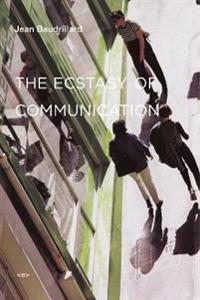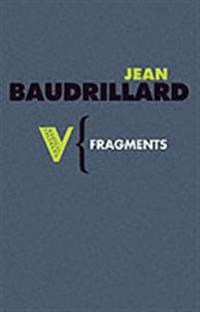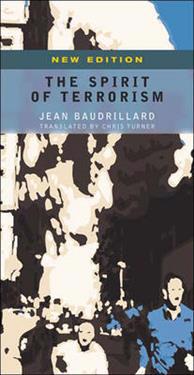Jean Baudrillard
ISBN: 9781474417785 - UTGIVEN: 2017-06Jean Baudrillard (1929-2007) was one of the world's most influential, celebrated and controversial thinkers. Originally published between 1968 and 2009, this collection of 25 pieces includes six interviews translated into English for the first time and a new transcription of a Q&A session with Baudr[...]
The Conspiracy of Art: Manifestos, Interviews, Essays (Pocket)
avJean Baudrillard
ISBN: 9781584350286 - UTGIVEN: 2005-08-19"The images from Abu Ghraib are as murderous for America as those of the World Trade Center in flames. The whole West is contained in the burst of sadistic laughter of the American soldiers, as it is behind the construction of the Israeli wall. This is where the truth of these images lies. Truth, bu[...]
Utopia Deferred: Writings from Utopie (1967-1978) (Övrig)
avJean Baudrillard
ISBN: 9781584350330 - UTGIVEN: 2006-09-28The Utopie group was born in 1966 at Henri Lefebvre's house in the Pyrenees. The eponymous journal edited by Hubert Tonka brought together sociologists Jean Baudrillard, Ren Lourau, and Catherine Cot, architects Jean Aubert, Jean-Paul Jungmann, Antoine Stinco, and landscape architect Isabelle Aurico[...]
In the Shadow of the Silent Majorities (Häftad)
avJean Baudrillard
ISBN: 9781584350385 - UTGIVEN: 200708Published one year after Forget Foucault, In the Shadow of the Silent Majorities (1978) may be the most important sociopolitical manifesto of the twentieth century: it calls for nothing less than the end of both sociology and politics. Disenfranchised revolutionaries (the Red Brigades, the Baader-Me[...]
Forget Foucault (Häftad)
avJean Baudrillard
ISBN: 9781584350415 - UTGIVEN: 200706In 1976, Jean Baudrillard sent this essay to the French magazine Critique, where Michel Foucault was an editor. Foucault was asked to reply, but remained silent. Forget Foucault (1977) made Baudrillard instantly infamous in France. It was a devastating revisitation of Foucault's recent History of Se[...]
Radical Alterity (Pocket)
avJean Baudrillard, Marc Guillaume
ISBN: 9781584350491 - UTGIVEN: 2008-04-30The Ecstasy of Communication (Häftad)
avJean Baudrillard
ISBN: 9781584350576 - UTGIVEN: 201212"The need to speak, even if one has nothing to say, becomes more pressing when one has nothing to say, just as the will to live becomes more urgent when life has lost its meaning."--from The Ecstasy of Communication First published in France in 1987, The Ecstasy of Communication was Baudrillard's [...]
Fatal Strategies (Pocket)
avJean Baudrillard, Dominic Pettman, Philippe Beitchman
ISBN: 9781584350613 - UTGIVEN: 200804When Fatal Strategies was first published in French in 1983, it represented a turning point for Jean Baudrillard: an utterly original, and for many readers, utterly bizarre book that offered a theory as proliferative, ecstatic, and hallucinatory as the postmodern world it endeavored to describe. Arg[...]
The Agony of Power (Häftad)
avJean Baudrillard
ISBN: 9781584350927 - UTGIVEN: 201101History that repeats itself turns to farce. But a farce that repeats itself ends up making a history.--from The Agony of PowerIn these previously unpublished manuscripts written just before his death in 2007, Jean Baudrillard takes a last crack at the bewildering situation currently facing us as we [...]
Don Delillo, Jean Baudrillard, and the Consumer Conundrum (Inbunden)
avMarc Schuster
ISBN: 9781604975048 - UTGIVEN: 2008-03The Spirit of Terrorism (Häftad)
avJean Baudrillard
ISBN: 9781781680209 - UTGIVEN: 2013-01Baudrillard sees the power of the terrorists as lying in the symbolism of slaughter--not merely the reality of death, but in a sacrifice that challenges the whole system. Where previously the old revolutionary sought to conduct a struggle between real forces in the context of ideology and politics, [...]
Radical Thinkers Set 7 (Häftad)
avAlain Badiou, Jean Baudrillard, Slavoj Zizek
ISBN: 9781781680605 - UTGIVEN: 201301Singular Modernity, Jameson Ethics, Badiou The Spirit of Terrorism, Baudrillard Infinitely Demanding, Critchley The Fiery Brook, Feuerbach Rationality and Irrationality in Economics, Godelier Capitalism, Socialism, Ecology, Gorz Critique of Instrumental Reason, Horkheimer Marxism and Philoso[...]
The System of Objects (Häftad)
avJean Baudrillard
ISBN: 9781844670536 - UTGIVEN: 200510A cultural critique of the commodity in consumer society, The System of Objects is a tour de force - a theoretical letter-in-a-bottle tossed into the ocean in 1968, which brilliantly communicates to us all the live ideas of the day.[...]
The Perfect Crime (Häftad)
avJean Baudrillard
ISBN: 9781844672035 - UTGIVEN: 200712In his new book, perhaps the most cogent expression of his mature thought, Jean Baudrillard turns detective in order to investigate a crime which he hopes may yet be solved: the murder of reality. To solve the crime would be to unravel the social and technological processes by which reality has quit[...]
The Transparency of Evil (Häftad)
avJean Baudrillard
ISBN: 9781844673452 - UTGIVEN: 200905The most important and original French thinker of the past twenty years. --J.G. Ballard
Fragments (Häftad)
avJean Baudrillard
ISBN: 9781844675739 - UTGIVEN: 200612This third book in the "Cool Memories" series is culled from Baudrillard's notebooks in the period when he was composing "The Illusion of the End" and "The Perfect Crime." In it, he resumes his investigation of the meta-metaphysics of objects. Like its predecessors, the book is a work of brief medit[...]
Passwords (Häftad)
avJean Baudrillard
ISBN: 9781844676767 - UTGIVEN: 201012In the spirit of Gilles Deleuze's Abecedaire, Passwords offers us twelve entry points into Baudrillard's thought.[...]
Impossible Exchange (Häftad)
avJean Baudrillard
ISBN: 9781844677917 - UTGIVEN: 201201Jean Baudrillard's now familiar investigations into reality and hyper-reality shift here into a more metaphysical frame. Working his way through the various spheres and systems of everyday life--the political, the juridical, the economical, the aesthetic, the biological, among others--he finds that [...]
The Intelligence of Evil or the Lucidity Pact (Häftad)
avJean Baudrillard
ISBN: 9781845203344 - UTGIVEN: 200509We are at war. Human cultures are divided into two basic types, two antagonistic forces, one based on symbolic exchange, which is dual and reciprocal, and one based on money and sign exchange, which is totalising. Non-western societies can create genuinely symbolic, durable cultures. But the western[...]
Screened out (Häftad)
avJean Baudrillard
ISBN: 9781859843857 - UTGIVEN: 2002-05'Watching the president's Christmas message produces this necropolar, white mass sensation. Seeing the video broadcast of the Christmas service in the cathedral itself, with these pathetic screens and the young worshippers slumped around them here and there, you tell yourself that God and religion d[...]
The Spirit of Terrorism (Häftad)
avJean Baudrillard
ISBN: 9781859844489 - UTGIVEN: 200308Baudrillard sees the power of the terrorists as lying in the symbolism of this slaughter. Not merely the reality of death, but a sacrificial death that challenges the whole system. Where the past revolutionary sought to conduct a struggle of real forces in the context of ideology and politics, the n[...]
Cool Memories IV, 1995-2000 (Häftad)
avJean Baudrillard
ISBN: 9781859844625 - UTGIVEN: 200305Jean Baudrillard's work of the last two decades has downplayed the position of the critical subject and gone over to the standpoint of the object. Nowhere is this objective (non-)critique which results so clearly played out as in the Cool Memories series. Here again, in this fourth collection of fra[...]
Why Hasn't Everything Already Disappeared? (Inbunden)
avJean Baudrillard
ISBN: 9781906497408 - UTGIVEN: 200910'Behind every image, something has disappeared. And that is the source of its fascination,' writes French theorist Jean Baudrillard in "Why Hasn't Everything Already Disappeared?" In this, one of the last texts written before his death in 2007, Baudrillard meditates poignantly on the question of dis[...]
Telemorphosis (Häftad)
avJean Baudrillard
ISBN: 9781937561000 - UTGIVEN: 201206The art of living today has shifted to a continuous state of the experimental. In one of his last texts, "Telemorphosis," renowned thinker and anti-philosopher Jean Baudrillard takes on the task of thinking and reflecting on the coming digital media architectures of the social. While "the social" ma[...]



























